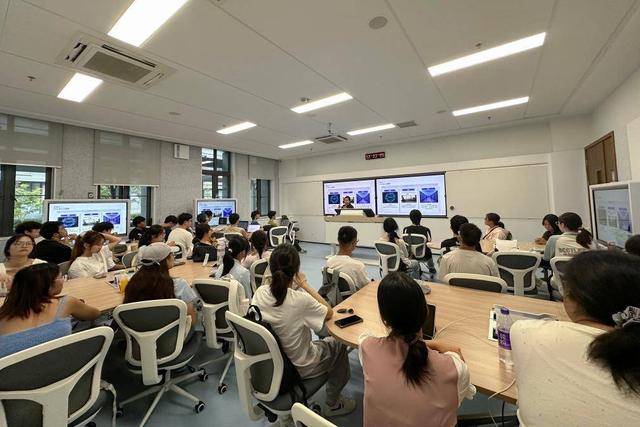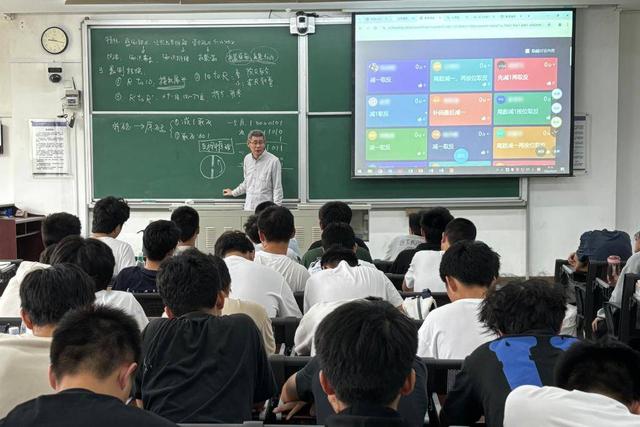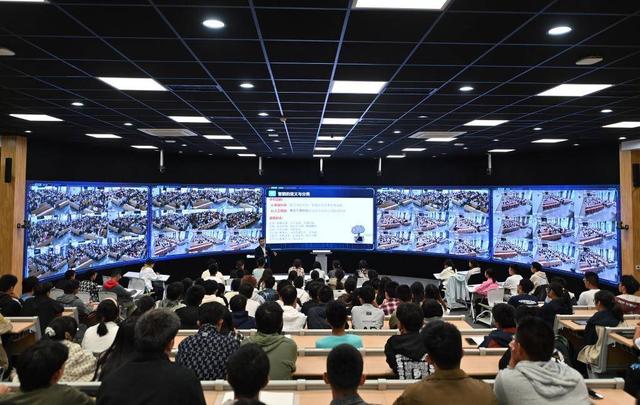AI enters life丨Artificial intelligence, "everyone can learn it" in colleges and universities?
Author:Eve Cole
Update Time:2025-02-07 08:00:02
Xinhua News Agency's "Xinhua Viewpoint" reporters Yang Zhanfei, Zhao Xu, and Zhu Han Starting from this fall semester, many universities across the country will offer general courses on artificial intelligence to undergraduates. Beijing announced that all municipal public undergraduate universities will have general courses on artificial intelligence, while Tianjin will The first batch of three municipal-level artificial intelligence general courses are fully open to universities across the city. This year, the Ministry of Education launched a large-scale artificial intelligence model application demonstration action in the education system, which will create an artificial intelligence general course system to empower the cultivation of various talents such as science, engineering, agriculture, medicine, and liberal arts. Artificial intelligence, which sounds like a relatively high threshold, is why “everyone can learn it” in colleges and universities? Entering the university general education class, "Can you tell the difference between music composed by musicians and music generated by AI?" "What are the differences between works created by humans and AI?" At the beginning of the new semester, in "Artificial Intelligence: Emotion, Art and Design" 》In the first class, with the help of vivid cases, Teacher Zhang Kejun of Zhejiang University led students from different majors to discuss the possibilities that the advancement of AI technology will bring to artistic creation and emotional expression. Jiang Quanyuan, deputy dean of the Undergraduate School of Zhejiang University and director of the Academic Affairs Office, introduced that this year the computer general compulsory course system has been fully upgraded, and multi-level artificial intelligence general compulsory courses will be offered to different majors across the school starting from the 2024 grade. This fall semester, five pilot classes were opened for sophomore and above undergraduate students, with a total of 256 students from non-related majors enrolling in the courses. It will be fully offered throughout the school starting from the spring semester next year.
This is the artificial intelligence general course class at Zijingang Campus of Zhejiang University taken on September 19. (Photo provided by Zhejiang University) Xu Ying, deputy director of the Academic Affairs Office of Beijing University of Civil Engineering and Architecture, said that the artificial intelligence general course offered this year is a compulsory course and is currently mainly open to 1,841 freshmen. It is optional for sophomores and above. "The school has regularly organized collective lesson preparation since last semester, constantly optimizing and improving teaching content to ensure that the course content is adapted to students of different majors; during the teaching process, supervision and inspection of this course will also be strengthened." Artificial Intelligence Communication of Beijing Municipal Universities The design of the literacy course is under the overall leadership of the Beijing Municipal Education Commission, led by Beijing University of Posts and Telecommunications, and the relevant municipal universities are responsible for the division of labor and joint participation in the completion. Sun Hongxiang, vice president of Beijing University of Posts and Telecommunications, said that the course content should take into account both difficulty and depth, be highly adaptable, and cover a wide range of topics. "The number of students is large, with diverse professional backgrounds and individual needs. It is necessary to take into account not only the differences in disciplines and majors between different institutions, but also the ability levels of the students." "Artificial Intelligence and National Governance" is a 61-year course offered by Fudan University this year. One of the "big AI courses". Xiao Guo, majoring in administration at Fudan University, said: "In the previous four-week course, the teacher systematically sorted out the AI policies and development plans of various countries around the world. Digital government and e-government are the development trends in the future. This course is the administrative course I studied. The management major is closely related and has helped me expand my horizons in this area. ” "Large models of artificial intelligence are forcing changes in traditional education." Wang Wanliang, a professor at the School of Computer Science and Technology at Zhejiang University of Technology, believes that promoting general education in artificial intelligence will help students in various majors master the basic concepts of artificial intelligence and realize the integration of artificial intelligence and Deep integration of education. Facing the Opportunities and Challenges of the Artificial Intelligence Era Artificial Intelligence has become a strategic technology leading a new round of scientific and technological revolution and industrial transformation, and has a significant and far-reaching impact on economic development, social progress, global political and economic patterns, and educational reform. "The introduction of artificial intelligence into university general education means that it has become a common technology in people's study, research and work. Using artificial intelligence has become a capability that everyone needs to master." said Wu Fei, director of the Artificial Intelligence Institute of Zhejiang University.
On September 29, first-year civil engineering students at Beijing University of Civil Engineering and Architecture were taking a general course on artificial intelligence. Students use their phones to answer questions, which are displayed on a screen at the front of the classroom. Photo by Xinhua News Agency reporter Zhao Xu In order to enable students in different majors to learn something, many universities have "tailor-made" learning content for students. According to the relevant person in charge of the Beijing Municipal Education Commission, the course module of the artificial intelligence general course MOOC in Beijing's universities has been designed in three general versions: science and engineering version, management version and art and sports version. Schools can "assemble" them individually according to the characteristics of students in different majors. course. Lv Cheng, the lecturer of the artificial intelligence general course at Beijing University of Civil Engineering and Architecture, said that students in non-information technology majors do not learn technology development and programming from scratch, but should establish scientific and systematic artificial intelligence cognition and concepts and cultivate basic artificial intelligence. Literacy, and initially learn to use artificial intelligence tools to solve basic problems in professional fields. "Many times, thinking is more important than doing it." Wang Wanliang said that learning artificial intelligence knowledge for non-major students can help them become familiar with technical needs and application ideas, and then propose solutions in professional fields. This is where innovation comes from. Artificial intelligence has brought unprecedented impacts and challenges to the human labor market, innovation capabilities, knowledge structures, and social ethics. How to deal with this challenge is also an important part of general education in artificial intelligence. "Artificial intelligence has the distinctive feature of interdisciplinary, and it is promoting the paradigm change of basic scientific research and breakthroughs in engineering and technical problems. The establishment of general courses on artificial intelligence is to enable students to move from knowledge-based to ability-based and abide by the ethical norms of artificial intelligence development." Wu Fei said. Sun Hongxiang said that the unified introduction of artificial intelligence general courses in Beijing's universities will certainly accelerate the improvement of students' scientific and technological literacy and innovation capabilities, and cultivate students' aesthetics, empathy, imagination and other "abilities beyond machines." Exploring the future of education and industry Looking around the world, it has become a consensus in the global education field that colleges and universities offer general courses on artificial intelligence. Many top universities have included it in the scope of general education. Relevant courses not only teach the core principles of technology, but also guide students to explore the social, cultural and ethical impacts of artificial intelligence technology in an interdisciplinary way. For example, Stanford University's "Artificial Intelligence - Activism - Art" course combines art and technology to encourage students to explore the application of AI in artistic creation while reflecting on the impact of technological progress on social values. The University of Cambridge, Imperial College London, and University College London in the UK have also launched general courses on artificial intelligence to lay the foundation for students' future career development.
On September 20, Professor Hu Qinghua from the School of Artificial Intelligence of Tianjin University was giving a lecture. On that day, Tianjin University’s “Introduction to Artificial Intelligence” course officially started. Photo by Xinhua News Agency reporter Li Ran From the perspective of the development of general education, university computer general education has experienced nearly 50 years of development, and its support for teaching and scientific research in non-computer majors has become increasingly significant. Nowadays, "College Computer" has become a required course for many college students like "College Mathematics" and "College Physics". Industry insiders pointed out that with the advancement of the construction of the "four new" professional systems of new engineering, new liberal arts, new medical science and new agricultural science in recent years, there is an urgent need to further empower students with a new generation of information technology and improve students' professional-focused artificial intelligence Application skills. General education is also distinguished from professional education. In recent years, many colleges and universities have added new "intelligent +" engineering majors such as artificial intelligence and intelligent construction. Experts believe that when facing the needs of emerging industries, in the future, majors should be downplayed and courses should be strengthened. By expanding organizational boundaries and subject boundaries, teaching content and curriculum systems should be updated with the times, and talent training models should be systematically improved. Currently, artificial intelligence general education is still under development. Colleges and universities are actively exploring better solutions in terms of teacher allocation, learning effects, training methods, etc., such as coordinating the deployment of professional teachers in the whole school or on a larger scale, applying modular teaching, reforming assessment methods, etc. "In the future, we need to pay attention to artificial intelligence training, focus on cutting-edge technologies and application scenarios, promote interdisciplinary and school-enterprise collaboration, and guide students to improve their abilities and strengthen their ethical awareness in practice. Only by closely integrating knowledge learning and practical application can we truly cultivate We will produce leading talents in the new era who have a sense of family and country, a global perspective, innovative abilities and ethical qualities,” Wu Fei said.


